What low horizons we Europeans sometimes have. When I first got an email inviting me to the first ever European Beer Bloggers Conference, my first thought was that it must be a joke or a scam. Not that I thought European beer bloggers were unworthy of being dignified with something as important and grand-sounding as a conference, I just didn’t expect this importance to be recognised by anyone with the resources to organise such an event. Then I spotted the name of Mark Dredge, one of the top UK beer bloggers, a fine writer who has also always struck me as a sensible fellow, which convinced me to click through to the registration page. But even Mark’s involvement was inadequate to bridge the credibility gap for some.
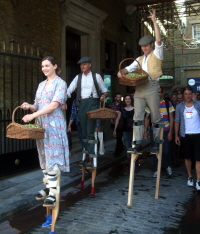
European Beer Bloggers Conference 2011: Hop pickers on stilts escort delegates from the old Whitbread brewery in Chiswell Street, City of London, to Dirty Dick's pub, courtesy of Wells & Young's.
In the event 72 people took a chance, assembling on Friday 21 May at the wonderfully appropriate main venue, the old Whitbread brewery on Chiswell Street on the northern edge of the City of London. Most of those were bloggers, with some mainly print writers, covering the spectrum from unpaid ‘citizen bloggers’ to successful professional writers who also blog, and a handful of industry people. Most were from the UK, unsurprisingly given the number of beer blogs based here and the language issue, but with a smattering from Belgium, France, the Irish Republic, Italy, the Netherlands and Sweden. A number confided later they had no idea what to expect. Collectively, however, we were not disappointed, for #EBBC11, as it was rapidly hashtagged on Twitter, turned out to be a remarkable and highly rewarding weekend — surely one of the most exciting beer-related events ever staged in Britain. It also had the feeling of being the beginning of something which can only get even better and more significant.
Interestingly, it took a US-based event organiser to convince us of our own significance. Allan Wright runs Zephyr Adventures, a small adventure holiday company based in Red Lodge, Montana. Through organising wine tours, Allan had encountered the wine blogging scene and for several years has run wine bloggers’ conferences in both North America and Europe. Thinking from a US perspective, a beer bloggers’ conference seemed a logical step and the first one was held in Boulder, Colorado, last year. I must admit that at this point I’d have been shaking my head at the obvious next challenge and thinking “it might work here but is it really going to work in Europe?” But in true American style Allan saw the opportunity and went for it. A little desk research led him to Mark and everything started to take shape.
In the process, Zephyr has stolen a march on the indigenous organisations. Committee members of the British Guild of Beer Writers could be heard at the conference muttering things like, “Why didn’t we do something like this?” CAMRA seems to have either failed to notice or chosen to ignore the event — perhaps unsurprisingly given its national chairman Colin Valentine’s recent rather boggling tirade against the ‘bloggerati’.
Most importantly, the brewers took it seriously, even some of the multinational ones. Molson Coors was a major presence, hosting a superb dinner on the first night. In attendance at this were two giants of brewing that both now operate under the Molson Coors umbrella — Sharp’s Stuart Howe and the legendary Steve Wellington, custodian of White Shield, who used the occasion to announce his impending retirement. Other significant supporters included Brain’s, Fuller’s, Hall & Woodhouse, Marston’s and Wells & Young’s. The effusive Václav Berka, head brewer at one of the world’s best known breweries, Plzeňský Prazdroj (Pilsner Urquell), flew in from Bohemia with a supply of unfiltered pils for a party in a room decked out with cardboard cutouts of the Plzeň townscape, as seen in the brewery’s impressive new stop frame animation commercial.
Free beer flowed copiously, and some of the attendees were clearly overwhelmed by the attention. Irish-based Reuben commented on his Tale of the Ale blog that he was treated like royalty. “We were treated like the gods of the blogosphere,” wrote Hayo on Dutch blog Beste tot nu toe.
Not that it was just one big boozeup — in fact most of the event was taken up with much more sober conference sessions, which by and large were extremely useful, interesting and engaging, with lots of open and lively discussion. Among those that most impressed were Peter Haydon’s erudite history of the big London porter brewers; Pete Brown and Tim Hampson in a sparkling, near-unscripted conversation on the past and future of beer writing; Pete again, alongside Melissa Cole and Mark Fletcher, dispensing blogging wisdom such as being aware of your audience, brevity and the ethics of freebies, highly appropriate under the circumstances; and workshops on technical beer tasting from FlavorActiV and beer and food matching from the Beer Academy.
The FlavorActiV workshop, in which we were invited to smell and taste six samples of Carling (courtesy of Molson Coors) that had been deliberately “spiked” with off flavours, was instructive if sometimes confusingly presented. I was relieved I recognised nearly all of the problematic flavours I’ve been writing about for years, but the oddly elusive, harsh and acidic note that results from a “lightstruck” beer in a clear glass bottle provoked the most discussion. It also yielded one of the event’s jaw dropping moments when a brewer from Shepherd Neame defended his brewery’s use of clear glass by asserting that being “sunkissed” was now regarded as a flavour characteristic of Whitstable Bay Organic Ale. Presumably they give each bottle a last turn on the sunbed before dispatching it.
Funding and resourcing a big event like this inevitably favours the presence of big names, which could give it a rather glossy, corporate flavour — but in brewing that’s thankfully offset by the genuine enthusiasm and love that pervades every level of the profession. And balancing things out were two events where smaller brewers shone. The Live Beer Blogging session on the Saturday afternoon included beers from the likes of Wallonia’s Brunehaut, Italian speaking Switzerland’s Bad Attitude and southeast England’s Windsor & Eton. The day ended at Camden Town brewery for a Night of Many Beers that included a range of Italian and Swedish craft beers making rare British appearances.
Indeed the theme of the relationship between big beer and small beer threaded through some of the meatier discussions at the event. Molson Coors’ director of public affairs Scott Wilson struck what I thought was a slightly defensive tone in his opening welcome speech with a plea to celebrate all beer rather than harping on divisions between craft and non-craft beer. Later David Sheen from trade body the British Beer & Pubs Association showed us some market research that suggested the majority of people don’t understand beer has a huge diversity of flavours and can partner a wide variety of foods.
When I suggested this may be because the weight of marketing over several decades has been to position a few unchallenging and innocuous beers as everyday bulk refreshers, distinguished from each other more by their funny adverts than their flavours, Scott snapped back that already dividing lines were being drawn, and that Carling is a speciality beer among the very large number of people for whom it is special. Next day the same company’s Kristy McCready — herself a great beer enthusiast and prolific tweeter — challenged BrewDog’s Martin Dickie, complaining he and his colleagues had attempted to boost their position by attacking other brewers’ beers as bland.
Now, of all the multinational brewers, I have considerable time for Molson Coors, at least as regards their interventions in the UK. They do actually seem to get craft beer, offering a number of products that for some drinkers will act as a stepping stone from mainstream beers to more challenging but ultimately more satisfying products. They have also provided an environment in which brewing talents like Steve Wellington can flourish, and I’m confident they will do the same for Stuart Howe at Sharp’s, continuing to support the production of small batch wonders like the partly distilled 24% Turbo Yeast Unspeakable Abhorrence from Beyond the Ninth Level of Hades III which we enjoyed after dinner on Friday night, as they’ve enabled Steve to pursue loving historical recreations like P2 and Bass No 1 at the Coors Visitor Centre.
But the idea that we shouldn’t make distinctions between mainstream beers and more specialist examples, let alone rank them in order of merit, doesn’t bear much examination. It also seems to fly in the face of marketing sense. Specialist beers are special precisely because they’re not mainstream, and have a more limited appeal to a more knowledgeable consumer — one that either always looks for a different experience from a beer than they’ll find in the mainstream, or who drinks mainstream beer in certain circumstances but finds specialist beer more appropriate for others. BrewDog have arguably crossed the line in some of their provocations, and Martin, clearly an instinctive rebel rather than a theorist, stumbled when challenged by Kristy. But they’re only following in the footsteps of US brewers like Stone in positioning their beers as products that aren’t for everyone, flattering their customers for setting themselves apart from the “bland” mainstream in choosing BrewDog beers. And it makes sound marketing sense.
And in the end, as an old-fashioned sceptic of the postmodernist thesis that everything is relative, I do think there are grounds to say that beers like Punk IPA and Thornbridge Jaipur and Rochefort 10 and Stone Smoked Porter, and indeed Worthington White Shield and Turbo Yeast Unspeakable Abhorrence from Beyond the Ninth Level of Hades III, are better and more valuable, in the grand scale of human culture, than Carling and Fosters. There’s nothing wrong with brewing or drinking the latter, but if beer is your chosen field of human endeavour, then the pursuit of creativity and excellence, and the appreciation of both, surely leads you to the boundaries of possibility rather than languishing in the comfort of the mainstream. And difficult though it might be to articulate, particularly in a culture like Britain’s which traditionally ducks explicit value judgements in favour of supposedly uncontroversial empiricism, I suspect most of the people at the conference instinctively feel this too.
Pete Brown inadvertantly touched on this point when he talked about knowing the audience and our motivations for writing and blogging. “How many people here blog because they want to persuade more people to drink more interesting beers?” he asked. And the majority of people in the room put their hands up. There’s nothing to be ashamed of in the pursuit of excellence.
Beer picks
- Belhaven Innis & Gunn Canada Day 2011 8.2% Dunbar, East Lothian, Scotland
- Molson Coors UK William Worthington Red Shield 4.2% Burton upon Trent, Staffordshire, England
- Nynäshamns Bedarö Bitter 4.5% Nynäshamn, Södermanland, Sweden
- Plzeňský Prazdroj kvasnicový 4.4% Plzeň, Plzeňský kraj, Czech Republic
- Sharp’s Turbo Yeast Unspeakable Abhorrence from Beyond the Ninth Level of Hades III 24% Rock, Cornwall, England
- Ticinese Bad Attitude Two Penny Porter 8.15% Stabio, Ticino, Switzerland


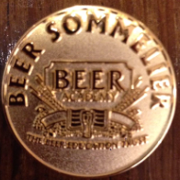
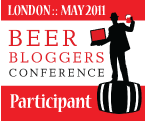
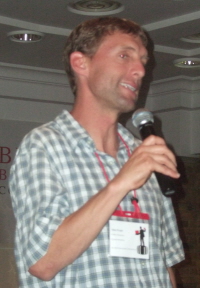
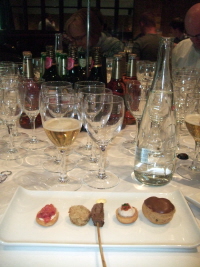
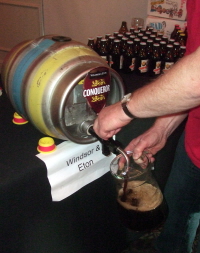
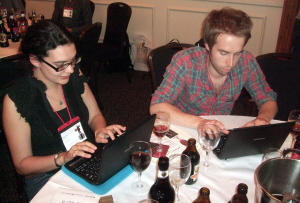
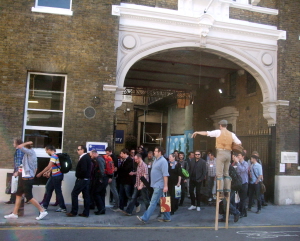
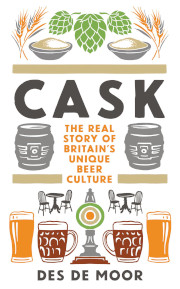
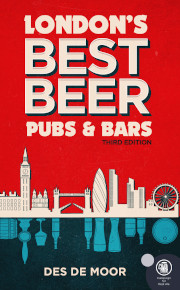
Great summary, Des – you really sum up the whole weekend well and touch upon many of the important points which arose from it!
I’m glad it was a successful event – like most people, when I first encountered the idea of a conference I was a little confused but we successfully worked our way through the first one and I expect next years to be even bigger and better – I can’t wait!
Dare I say it, my favourite write up so far (and not just because I’m in it!!).
It’s been levelled that we just had a big jolly and whilst we did, what resonated for me, especially given the fighting that’s happening around the tinterweb at the moment, was “but in brewing that’s thankfully offset by the genuine enthusiasm and love that pervades every level of the profession”
I’m yet to meet a brewer who doesn’t love what they brew – am not sure how many other professions could claim the same – that is definitely worth celebrating!!
And it’s disappointing that Martin didn’t give me much of an answer, left me wondering how much of what they say is true Brewdog belief and how much is a PR agency somewhere if they can’t defend their own position. Hardknott Dave did suggest we all got together to discuss in more detail – we’re still waiting on a reply…..
Brilliant Des. At last a post that analyses and really gives a flavour of the event.
Excellent report, Des. You truly captured the spirit of what Allan and the “bloggerati” are trying to do with these conferences. I attended the first conference in Boulder and plan to attend the next in Portland, Oregon. I had hoped to make it to London (were there ANY bloggers from the Colonies in attendance?), but it sounds from your review, and others that I’ve read, that it was a resounding success, and I’m thrilled to hear it.